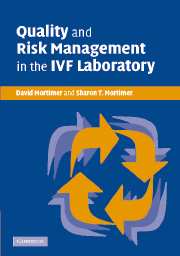Book contents
- Frontmatter
- Contents
- 1 Introduction
- 2 Regulation, licensing and accreditation
- 3 Quality and quality management
- 4 What is risk?
- 5 Process and systems
- 6 Making it work
- 7 Quality and risk management tools
- 8 What's gone wrong? Troubleshooting
- 9 Risk management: being proactive
- 10 How are we doing? Benchmarking
- 11 Specifying systems
- 12 Human resources: finding (and keeping) the right staff
- 13 The well-run lab
- 14 References and recommended reading
- Index
2 - Regulation, licensing and accreditation
Published online by Cambridge University Press: 01 September 2009
- Frontmatter
- Contents
- 1 Introduction
- 2 Regulation, licensing and accreditation
- 3 Quality and quality management
- 4 What is risk?
- 5 Process and systems
- 6 Making it work
- 7 Quality and risk management tools
- 8 What's gone wrong? Troubleshooting
- 9 Risk management: being proactive
- 10 How are we doing? Benchmarking
- 11 Specifying systems
- 12 Human resources: finding (and keeping) the right staff
- 13 The well-run lab
- 14 References and recommended reading
- Index
Summary
What's the difference?
Regulation, licensing and accreditation are often confused with each other, or seen as alternative viewpoints on how IVF labs are governed. In fact, they are different concepts and all three must work together within an integrated system of governance. Let's start with some definitions.
Regulations These are legal requirements to which an organization or individual must conform in order to operate. Compliance is often verified by inspection (examination for individuals) and confirmed by the issuance of a license. Regulations are typically highly prescriptive as to what an organization or individual must/must not do in order to be compliant.
Accreditation This is a collegial process based on self- and peer-assessment whereby an authoritative body (usually a non-government organization) gives formal recognition that an organization is in voluntary compliance with one or more Standards set by the authoritative body. Unlike licensing, accreditation is based upon process rather than procedure, and the principles of quality improvement rather than strict obedience of regulations, so that it is not prescriptive in relation to technical procedures or rules. The end result of an accreditation process (being “accredited”) is often termed certification or registration by the authoritative body.
Licensing This is the process whereby an organization (or individual) is identified as being compliant with required regulations. Usually, licensing is a legal requirement under government regulations in order for an organization to be allowed to operate [cf. certification]. For individuals, licensing is conferred to denote their competence to perform a given activity (e.g. driving a motor vehicle) in compliance with regulations.
- Type
- Chapter
- Information
- Quality and Risk Management in the IVF Laboratory , pp. 8 - 23Publisher: Cambridge University PressPrint publication year: 2004



